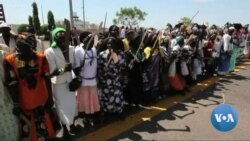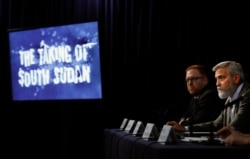The international community must do more to tackle networks of global corruption that are fueling violence in South Sudan, according to campaigners.
The call follows the publication of a report detailing how corporations have profited from the country's civil war. The investigation by The Sentry organization — co-founded by actor George Clooney — shows the links among armed groups involved in the civil war, global oil giants, and British and American citizens.
May 2013 in Upper Nile State, South Sudan. Celebrations are staged to mark the reopening of the Palouge oil field. Government ministers pose alongside Chinese workers and executives from Dar Petroleum — as the oil pumps are switched on in the world’s youngest nation.
Just months later, a brutal civil war erupts, killing hundreds of thousands of people.
At a news conference last week in London, The Sentry group outlined how Dar Petroleum played a central role in the conflict. John Prendergast is the group’s co-founder.
“Dar Petroleum is owned by some of the biggest and most powerful companies in the world — China National Petroleum Corporation, Sinopec and PETRONAS from Malaysia — and they are all complicit here. These multinational companies are not just passive beneficiaries of a horrific status quo. They have actively participated in the destruction of the country. They've supported deadly militias; they've seriously polluted the environment. And they paid off government officials along the way,” Prendergast said.
China National Petroleum Corporation and Sinopec could not be reached for comment. PETRONAS has not yet responded to VOA inquiries.
Civil war
South Sudan was plunged into war in December 2013, when President Salva Kiir accused Vice President Riek Machar of plotting a coup. Sentry co-founder George Clooney says the conflict was fueled by global corruption.
“They received money, oil, transportation and weapons from a vast array of people and corporations all over the world who have profited from this crisis,” Clooney said.
The Sentry’s Debra Laprevotte outlined how corruption drove the civil war.
“A company owned by President Kiir’s 20-year-old daughter and her foreign business partners obtain a mining license in a territory in which the government's military, which are under the control of her father, President Kiir, later drove thousands of people from their homes,” Laprevotte said.
Part of the system
Corruption is part of the system across the region, says analyst Rachel Ibreck of the University of London, author of the book "South Sudan’s Injustice System."
“People were engaged in accumulating political budgets in order to reward their followers. And these political budgets were very often dependent on 'behind the scenes' deals. So it's not to be seen simply as an individualized activity, but rather is part of a system,” Ibreck said.
The Sentry report says two British citizens formed an oil company with a general who is accused of forcibly recruiting child soldiers, and details how Ara Dolarian, an American arms dealer, allegedly tried to sell $43 million worth of weapons to rebel South Sudanese General Paul Malong.
Paying with their life
Those exposing corruption can pay the ultimate price. Lawyer and activist Dong Samuel Luak was detained in Kenya in 2013 and murdered in South Sudan. He had worked with The Sentry investigation.
“We can see what the level of pressure is on those people who try to stand up against the system, but we can also see how important they have been in this kind of activity of trying to expose what's going on,” Ibreck said.
The Sentry is calling on the international community to impose sanctions on the networks of corrupt and criminal activities that have fueled the violence.






